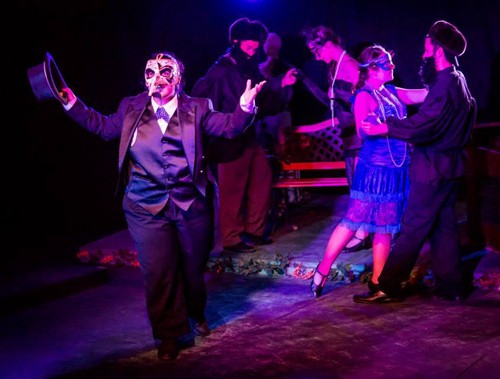Launching a company is a lot like taking the stage for the first time — you have to get over any of the fears that will hold you back.
Brian and Shelby Maticic know that fear as well as anybody. They also know about getting through it.
The couple started Brelby Theatre Company in 2009 after graduating from Northern Arizona University in Flagstaff. Their mission was to create opportunities and challenges for themselves and local actors and artists. Now at a permanent location in Glendale, the two work busy lives as both artists and business owners. Their activities cover everything from writing plays and rehearsing to finding business sponsors and starting promotions.
With Brelby starting its seventh season, I talked with the couple about their experience forming the company and what it takes to build a community around their passion.
Q: What was the draw of owning your own theater company?
SM: Partially because Brian is a playwright … we knew it would be easier to get his work seen if we were the ones doing it, instead trying to send it out to other theaters.
BM: As an artist, it’s a different approach that’s much more prevalent now to create your own opportunities, as opposed to going out and trying to find them elsewhere. It wasn’t just an opportunity to get my scripts seen but it was also an opportunity to get to direct way more than we would have at this point in our lives, to act in a number of roles we wouldn’t have normally had access to. And also to get those opportunities to other Arizona artists who wouldn’t have them otherwise, which is one of our major tenets.
SM: We surrounded ourselves with some really enthusiastic peers, so we had a really great group to start with. We’ve been really lucky to continue attracting people who are drawn to that entrepreneurial spirit, where they’re young and excited to work hard on original things that no one else has seen before.
Q: When did you know this was achievable?
BM: I actually founded my first theater troupe when I was seventeen or eighteen. As I continued through college, I never really lost sight of that.
SM: The seeds were initially planted when we took theater management (class) together as undergrads. We both had the same mentor in college and a lot of his experience was in management and fundraising and working in some really prestigious theaters. Through that class, it started clicking that this was something we could do.
BM: Not just do, but make a career out of.
SM: Yeah. And as we became more serious in our personal life, we started thinking how we could build a life together making art and this seemed like one of the best ways to do it.
Q: Did you have much resistance when you told people this is what you wanted to do?
SM: We had some people who raised their eyebrows or who questioned our choice to produce so much original work, but we’re both really lucky that we come from families that are really, really supportive of our decisions to go into a field where we will be theoretically making very little money.
BM: And beyond that, just pursuing something we’re passionate about and wanting to be happy in our careers. My dad definitely raised an eyebrow when I was a junior in high school and I told him I was going to go into the arts and not the sciences. (Laughs) Once he swallowed that, it took him about a week and he was the biggest supporter I could have asked for.
Q: What’s the most rewarding part of running this business?
SM: With this particular company, it’s the family we’ve created here. We have this really lovely, tight knit, but really welcoming group of artists that call this their second home. They’re the people who support us when we’re struggling, they’re the people we confide in and share successes with.
BM: The successes that I celebrate most are when we help an artist achieve a new level or do that thing they didn’t they were capable of or direct their first play or write their first scene or any of those things that otherwise, if Brelby didn’t exist, they’d never have the opportunity to do.
Q: When will have you “made it?”
BM: I would say there are two answers to that. One answer is that we’ve already made it. We work every day to create the art that we’re passionate about, we get to pick the projects we want to work on, we get to inspire others to go after the work that they want to do. The other is that we’ve never made it because we’re always striving to be better, to reach more people, to produce the next show better than the last one. In one sense, we’ve already been there, in the other sense, we’ll never actually achieve it because we’re constantly working towards that betterment.
SM: That’s very indicative of an entrepreneur, never being satisfied and never settling. We have a lot of “big stretch” goals that I don’t know if we’ll ever be able to reach, but we’re going to have a lot of fun trying to.
Q: How do you deal with the business side, after being so dedicated to the artistic side of the business for so long?
SM: We complement each other really well in the different aspects that you need to fill out a leadership team, but there’s some stuff you can’t predict. There’s things you are never going to see coming until you’ve been thrown to the wolves in the real world.
BM: One of our strengths is that we are willing to acknowledge our shortcomings when we run into something and we have no idea how to approach it. We’re not above finding someone who’s dealt with it before or someone who has ideas and asking them, if they were in this situation, where they would go or if they could point us in the right direction.
Q: How important is technology in your business?
SM: We’re very driven with our social media presence, that’s how we built our original audience base. It’s something that is pretty indicative of our generation, but is also something that we encourage and cultivate here. We have a hashtag for every show we do so our artists are encouraged to take pictures through the rehearsal project behind the scenes.
BM: We don’t even do physical ticketing, everything is done by phone or online or in person and it goes onto a digital will-call list. We have our “ShowGO” program, which we’re really proud of and is a unique program, kind of like a Netflix for live theatre, if you will. You pay $10 a month, it auto charges off your debit card and you can see anything we produce any time that you want. It provides the flexibility that our generation wants.
SM: It’s not that we’re only creating theater for millennials, but it’s just kind of happened that way where our largest demographic is millennials. The students that are still in college can actually afford it, as opposed to the $150 season tickets that other theaters charge. That has to be a huge investment for them and we’ve made it a lot more approachable for young people to get regular art in their lives.
Q: What would you say to a fellow millennial thinking about turning their own creative passion into a career?
BM: If you can see yourself being happy doing anything else, do it. If you can’t and you know you need to do theatre, do everything you can to make it happen. I think it holds true for anyone pursuing a passion. To become an entrepreneur in whatever that is, you have to have the wherewithal to understand that you need to believe in yourself and continue because you’re going to fail. You have to be willing to learn from those mistakes.
SM: I would suggest doing your best to ingrain yourself into the arts community. Don’t let yourself be insular, know what else is out there because that’s where you’re going to find allies. And know what tools are within your grasp. Part of it is doing the homework and figuring out what can make doing the things you don’t know how to do easier.
Q: How do you get over a fear of failure, especially when you’re career is on the line?
BM: For me, a certain element of the fear is always there and until you’ve really made it to where you don’t have to think about it and the money’s just rolling in, which I don’t l know if I know anyone who is at that point, it’s always going to be there. If you know you’re spending money and it’s going to a specific goal, even if you reach that failure you know that money was spent pushing you to a specific goal. There are very few mistakes in this life that you can’t make up for or correct or find a way around.
Q: What do you enjoy most about running your own theater company?
BM: There’s obviously huge challenges and things you don’t expect, but the benefits are incredible and numerous. Everything from having control of your own destiny to having complete artistic freedom.
SM: Yeah, there’s something really freeing and invigorating about creating art with your best friends. You come home from or you go create beautiful things after work and I feel really lucky that this is what we get to do.











